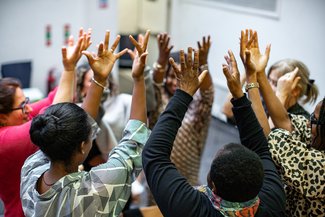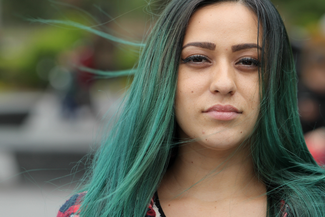
Women's Justice Reimagined
Ending inequality for Black, Asian, minoritised, and migratised women in the criminal justice system.

7 Oct 2024
With news of a newly created Women’s Justice Board (WJB) announced at Labour Conference, there is increased hope across the women’s and criminal justice sectors that this new government are serious about implementing change for women involved with the criminal justice system.
Lord Secretary Shabana Mahmood stated the WJB’s aim is to reduce the number of women in prison, and long-term decrease the number of women’s prisons overall.
This will require not just attending to the experiences and needs of women whilst they are inside, but investing carefully in community-based support that can effectively divert them from criminalisation, and address the challenges women face after conviction or prison release.
We are currently working towards a new policy briefing, offering a contemporary overview of the issues facing women and girls with multiple unmet needs in contact or at risk of the criminal justice system.
To provide expert insight as to some of the topics it will cover, our member, Kairos Women Working Together, have written this guest blog, sharing Mary's story to highlight the significant challenges they see women facing upon release from prison.
Kairos is a charity run by women for women who are facing multiple disadvantage and are risk of or subject to sexual exploitation. One of our core services is our Women’s Justice Service that supports women in contact with the Criminal Justice System (CJS).
Mary (name changed) has shared her story to show how the CJS, and other connected statutory services, often sets up women to fail, perpetuating their involvement in the system.
Mary shared;
“When I came out of prison there was no support put in place for me, I had no mental health support…All I had was probation appointments which was really overwhelming…It felt like I was coming out of a prison into another prison.”
“When I was in prison I had no support with my housing.. ending with rent arrears when I got out which I am still struggling to manage. It was like they expected me to go inside for 8 months and pick up my life when I was released…my life is so much worse than before I went into prison.”
Mary’s experience of the lack of support in place when being released from prison is a far too common reality for many women. Many of the women Kairos supports have no contact with the outside world while in prison and so can struggle to make contact with essential services like housing. This results too frequently in situations like what she’s described. Part of Kairos’ Women’s Justice Service is to support and advocate for women whilst they are inside, which enables them to plan and put in place what they need for their release day.
“My medication wasn’t allowed to be prescribed for me to have myself at home before I went into prison, as I kept trying to overdose. When I left prison, they gave me a 2 week dose which specifically said ‘do not give to patient at once’ and they still gave the whole pack to me. Which shows how little care and attention they put into you…whilst I was in prison I had regular medication which helped me feel more stable, and when I left nothing was put into place for my medication – which ended up in me overdosing.”
Accessing the right support for mental health is a significant barrier for the women Kairos supports. Women are often released without their prescribed medication. Kairos advocates for this to be dealt with urgently upon their release, but this can be very challenging. Women’s mental and physical health is often affected by this lack of post-prison release care.
“My little boy was put up for adoption…which is why I spiralled out of control. I was told there would be things put in place for when that happened and it didn’t… If support was put into place before my mental health got that bad, then maybe things would have been different…
because I had no support, it just ended up with me lashing out because of how bad my mental health was, which I kept getting in trouble for. After… I got arrested…my picture was all over the internet with articles written about me, I couldn’t cope with that and it made my mental health so much worse.”
Kairos frequently sees women facing multiple barriers to accessing support and systems not recognising their specific needs. Often women are victim-blamed for situations where they are the victims of exploitation, that could have been prevented with the right support. At Kairos we want to challenge victim-blaming cultures and ensure that women’s needs are met in a trauma-informed way.
“I had so many rules on my license that I had to follow, it felt like they were waiting for me to slip up. They said I had to do community service, which I couldn’t do because of my mental health/Autism…They could have spent those 18 months actually trying to help my mental health rather than just sign off that I attended probation. It didn’t help me at all, it just made everything worse. I was getting so frustrated, so when I lashed out again they said they had no other option but to send me to prison.”
At Kairos we offer holistic support, which we consider essential to avoid situations like the above. This enables trusting relationships to be built, to advocate for a woman’s needs, and to help her navigate the rigid barriers within the system.
“It’s almost like you need to go to prison for them to see you have problems that you need help with, they throw you in prison but then don’t help you when you leave. So how is anything supposed to change.
The system represents a certain kind of woman doesn’t it, we are called the broken ones but why are we like this in the first place? Because of the system. Its broken.”
At Kairos we strive for all women to live empowered lives, free from exploitation, abuse and violence. Mary’s story demonstrates the need for systems change and for services to work together and in sync.
It shows why the holistic, relational, trauma-informed support that Kairos offers is so necessary, to support women to navigate the significant barriers which keep them trapped in the criminal justice system.

Ending inequality for Black, Asian, minoritised, and migratised women in the criminal justice system.

Engaging with young women, front-line staff and other experts to build an evidence base about the needs of girls and young women in contact with the criminal justice system.

We respond to the Lord Chancellor Shabana Mahmood MP's announcement of the creation of a Women's Justice Board at Labour Conference.